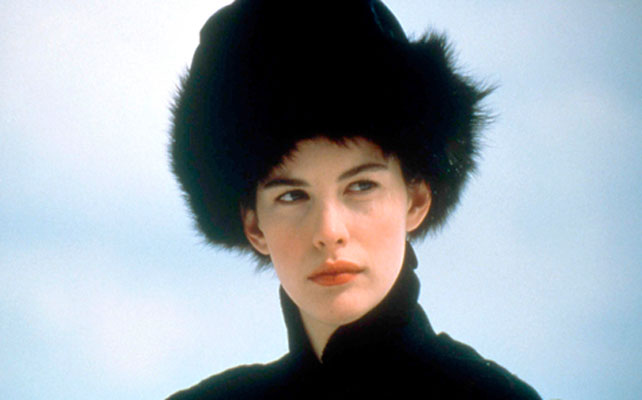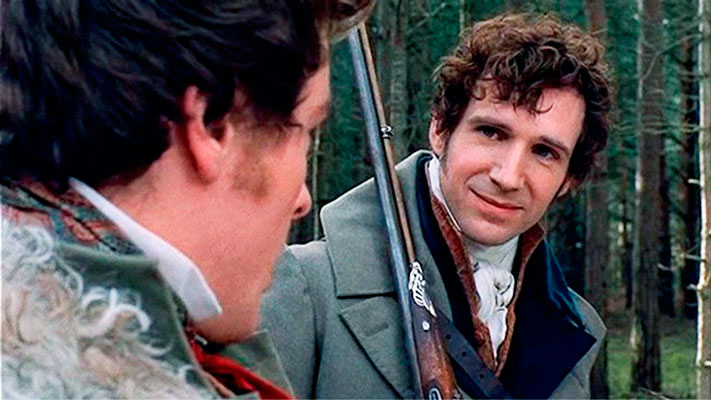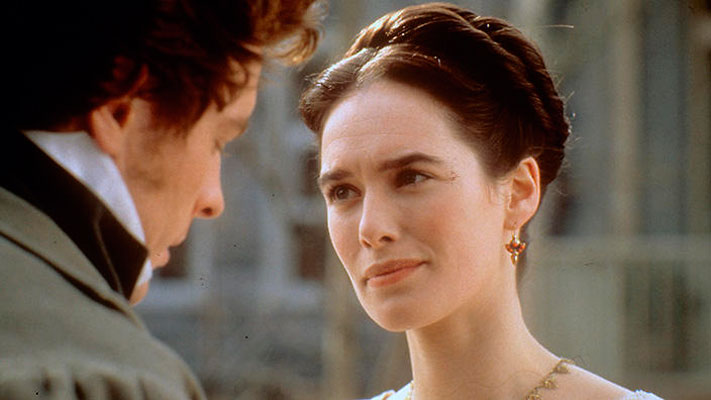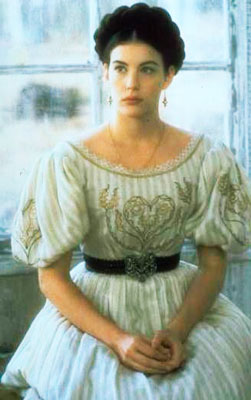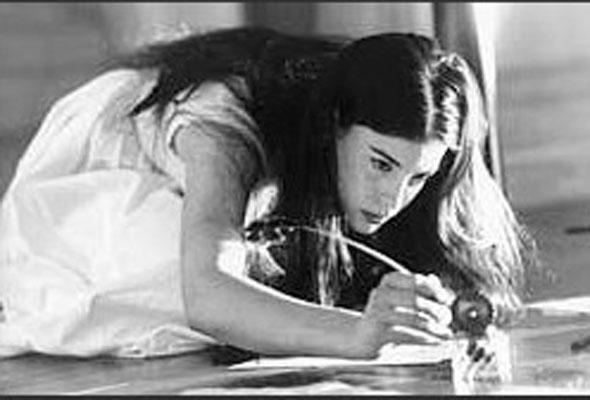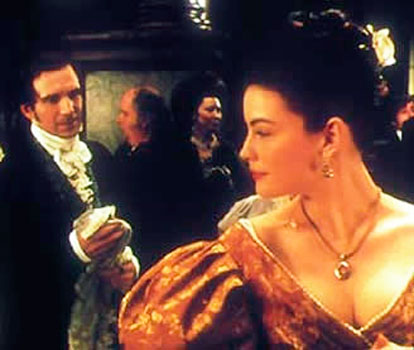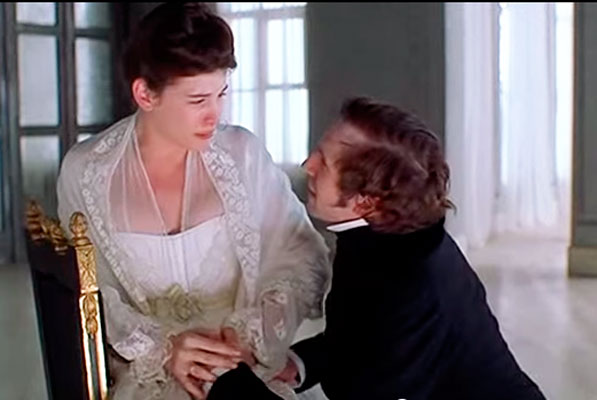One Woman's View: Martha Fiennes' ONEGIN 1999
by Paulette Reynolds
August 1, 2017 *
Directed by Martha Fiennes
Starring Liv Tyler/Tatyana Larina, Ralph Fiennes/Yevgeny Onegin, Toby Stephens/ Vladimir Lensky, Lena Headey/Olga Larinа, Martin Donovan/Prince Nikitin, Harriet Walter/Madame Larina
by Paulette Reynolds
August 1, 2017 *
Directed by Martha Fiennes
Starring Liv Tyler/Tatyana Larina, Ralph Fiennes/Yevgeny Onegin, Toby Stephens/ Vladimir Lensky, Lena Headey/Olga Larinа, Martin Donovan/Prince Nikitin, Harriet Walter/Madame Larina
"A woman's film is a movie that places at the center of its universe a female who is trying to deal with the emotional, social, and psychological problems that are specifically connected to the fact that she is a woman." 1
Jeanine Basinger, A Woman's View: How Hollywood Spoke to Women
Although film historian Jeanine Basinger was referring to a particular period of films about women in her seminal book, A Woman's View, she was also one of the earliest female film critics to hone in on what are the essential elements of the woman's film.
She defines such a film as "...[Where] women actually take on heroic dimensions, bursting forth from the boundaries of female behavior to become "female heroes"...[as] a woman who defies conventional rules and redefines her life on her own terms..." 2
Published in 1993, many of Ms. Basinger's observations are now just breaking through the cinematic glass ceiling, thanks in part to the new upsurge in the Women's Movement. This awareness and celebration of female empowerment is growing across multiple media platforms, as a new generation of female artists add their voices to the demand for equal representation in the entertainment industry.
In the spirit of that celebration, I'd like to include Martha Fiennes to Bitch Flick's list of female directors to honor. Ms. Fiennes falls into that category of female film directors who holds a scant resume of two films - Onegin (1999) and Chromophobia (2005) - yet deserves a second look, especially for Onegin, her directorial debut.
Onegin is based on the novel, Eugene Onegin, 1833, written by what many consider to be the father of modern Russian literature, Alexander Pushkin. In his celebrated story, he creates a woman of strength and empowerment in Tatyana, the first female hero of Russian literature.
Martha Fiennes' Onegin appears to focus on Eugene Onegin, a bored and aimless Russian aristocrat (portrayed by Ralph Fiennes), who's forced back to his ancestral roots when his rich uncle dies. He reluctantly takes up residence on his new estate - which include several mansions, villages and serfs. That he is now wealthy beyond imagination - and hence, more powerful - means little to Onegin, who scorns the idle rich (while including himself in his contemptuous worldview).
A chance encounter with a young poet, Vladimir (Toby Stephens), from a neighboring estate makes his stay in the unsophisticated countryside bearable, especially when he meets Tatyana Larina, played by Liv Tyler. Tatyana's sister, Olga (Lena Headey) and Vladimir are expecting to marry, much to her mother's annoyance, since she looks forward to both her daughters marrying within their social circle. Onegin, with his worldly experience, can see at once that Olga is rather vain and shallow, and considers her beneath Vladimir's station, but she suits the young poet's youthful ego and he eagerly awaits their wedding day.
Tatyana however, is not so easily stereotyped, as she is no country girl looking forward to the bridal veil. This serious young woman reads "literature", which causes her mother to fear it will warp her feminine sensibilities. During a small dinner party Tatyana firmly voices her disagreement with the Russian policy of serfdom, something that Onegin initially shares when he states he'll free his serfs and rent them his land to farm.
Later, curiosity gets the better of Tatyana and she seeks out Onegin in his library. She asks him if he'll really free his serfs, and he answers that his idle lifestyle rules out the responsibility of maintaining the land, so he really doesn't care about the question of serfdom at all. Rather than be offended by his lack of political conscience, Tatyana values his honesty, something that she sees few people display in her small community.
Later, curiosity gets the better of Tatyana and she seeks out Onegin in his library. She asks him if he'll really free his serfs, and he answers that his idle lifestyle rules out the responsibility of maintaining the land, so he really doesn't care about the question of serfdom at all. Rather than be offended by his lack of political conscience, Tatyana values his honesty, something that she sees few people display in her small community.
While Tatyana and Olga are like oil and water, one common belief they share is in the romantic ideal of love, and she wastes no time in falling for the aloof, brooding Onegin. Her lack of experience encourages her to read about love and romance in books and she tries to make sense of why a cosmopolitan man would hang around the rural shade of an empty estate. The viewer is already aware that Onegin cares more than he's willing to admit, and Tatyana takes a chance and shares her feelings for him in an ink- smudged letter. Once sent however, she notices her inky hands and slowly wipes them on her white nightgown, and as the quiet moonlight falls upon her we can feel her misgivings giving birth.
Tatyana's mother invites Onegin to her daughter's naming party and she takes the opportunity to confront him about his silence. Diplomatically he tells her that any affair they might have would end in ruination for her, due to his dislike of marriage. "Can't you see where this leads? A declaration, a kiss, a wedding, family, obligation, boredom, adultery." He sees her feelings as 'romantic imaginations' of a young girl, that will ripen into something more meaningful for someone else at a later time. She sorrowfully states, "you curse yourself", and no sooner are the words uttered than everything goes horribly wrong for Onegin. In the next few hours he will be forced into a fatal duel with Vladimir and flee Russia for a more peaceful isolation.
Six years later Onegin returns and happens to spy a woman at a ball hosted by his cousin, Russian Crown Prince Nikitin. His eyes and the camera follow this tall, dark- haired woman, who's scarlet red gown stands out amid a sea of pale dresses and fans. She casually encircles the entire room, proud and confident, as we realize that it's Tatyana. Onegin asks the Prince who she is, and is astounded to recognize the girl who once gave her heart to him is now Nikitin's Princess. He asks for the next dance as a pretext to speaking with her, but she gently rebuffs him and walks away. "It's true", her husband confides sadly, "she doesn't like to dance."
Six years later Onegin returns and happens to spy a woman at a ball hosted by his cousin, Russian Crown Prince Nikitin. His eyes and the camera follow this tall, dark- haired woman, who's scarlet red gown stands out amid a sea of pale dresses and fans. She casually encircles the entire room, proud and confident, as we realize that it's Tatyana. Onegin asks the Prince who she is, and is astounded to recognize the girl who once gave her heart to him is now Nikitin's Princess. He asks for the next dance as a pretext to speaking with her, but she gently rebuffs him and walks away. "It's true", her husband confides sadly, "she doesn't like to dance."
In the days that follow, Onegin feverishly pursues Tatyana with his own letter and declarations of love, but it doesn't take much to see that this Tatyana is not so easily swayed. Although she married as society expected her to do, she wisely chose a man who could be happy with an independent woman. Prince Nikitin might one day govern a country, but in the matters of marriage and sex Tatyana rules her world with a calm and steady grace.
Onegin is finally able to snatch a few moments alone with Tatyana, where he begs her to run away with him. She tearfully informs him that he's just a bit too late, finding it ironic that he would eagerly aid in her downfall, now that it is he who feels the sharp pains of unrequited love. The mature Tatyana may still care for Onegin, but she refuses to go against her own standards to ease his suffering and her discomfort. She orders him not to see her ever again and walks away, leaving Onegin to wander alone, yet again.
Onegin is finally able to snatch a few moments alone with Tatyana, where he begs her to run away with him. She tearfully informs him that he's just a bit too late, finding it ironic that he would eagerly aid in her downfall, now that it is he who feels the sharp pains of unrequited love. The mature Tatyana may still care for Onegin, but she refuses to go against her own standards to ease his suffering and her discomfort. She orders him not to see her ever again and walks away, leaving Onegin to wander alone, yet again.
It might be helpful to the Western gaze to keep in mind that on one level Onegin and Tatyana represent twin aspects of the universal Russian soul, blazing with passion just below a cool surface. Director Martha Fiennes unlocks this costume classic for a modern audience, deftly allowing the two main characters to take their share of the center stage to tell their stories. While Ralph Fiennes' Onegin plays a familiar type of romantic male, Liv Tyler's Tatyana is not often familiar, even in modern love stories. She does not play the martyr, pining for someone she can't have, but rather takes stock of what she needs in life and makes her choices accordingly, regardless of how others may feel. Ms. Tyler's well-crafted performance brings Puskin's female hero forever into our consciousness, where she can add her voice to the growing feminine collective.
Reference
1/2:
Jeanine Basinger. A Woman's View: How Hollywood Spoke to Women 1930–1960 Wesleyan University Press: Middletown, Connecticut | Alfred A. Knopf, Inc. 1993. Print
1/2:
Jeanine Basinger. A Woman's View: How Hollywood Spoke to Women 1930–1960 Wesleyan University Press: Middletown, Connecticut | Alfred A. Knopf, Inc. 1993. Print
* Originally published at Bitch Flicks.com, as part of their 'Celebrating Women Directors' Month in May, 2017.
http://www.btchflcks.com/2017/04/martha-fiennes-onegin.html#.WTDj48aZNHY
http://www.btchflcks.com/2017/04/martha-fiennes-onegin.html#.WTDj48aZNHY
COPYRIGHT 2012/2017. Paulette Reynolds. All CineMata Movie Madness blog articles, reviews, faux interviews, commentary, and the Cine Mata character are under the sole ownership of Paulette Reynolds. All intellectual and creative rights reserved.

